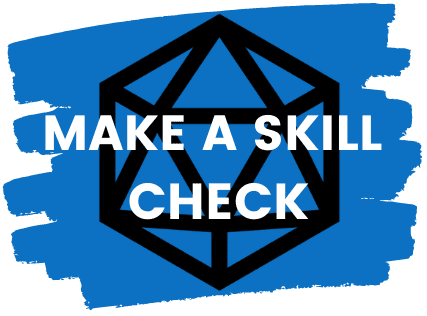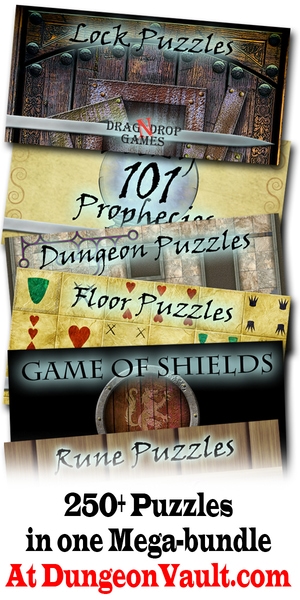Elder Scrolls-like skill books are pervasive in games and rightfully so—knowledge truly is power. Throughout the years, there have been versions of skill books, but because they generally give numerical bonuses, they defy 5e’s Bounded Accuracy. As such, when, how and should you include skill books in your game?
Skill books can provide short- or long-term benefits, but to avoid power differences between players, it’s best to provide short-term ones with limitations. One book per long rest; bonuses last 24h; avoid numerical bonuses, opting for advantage/proficiency in narrow areas. Read on for more detail.
That’s the short of it, but let’s dive into the long, beginning with Bounded Accuracy, since skill books of this type will require homebrewing and that requires some understanding of the system.

Table of Contents
What is Bounded Accuracy?
Bounded Accuracy means streamlining the system, avoiding being bogged down by endless competing modifiers (see Pathfinder for that) while trying to keep the game balanced.
It removed many of the numerical bonuses for classes, instead opting for additional dice, proficiencies, and using the advantage system.
No more considering whether your +3 armor and +2 ring stack or not, keeping track of all these floating numbers for every situation. They even removed feats that grant numerical bonuses to attacks altogether and capped attuned items to 3 (with some exceptions).
Class bonuses were limited to a maximum of +6, weapons are capped at +3, and ability scores are generally kept 20 or less (exceptions mentioned below).
This simplification and streamlining is one of the bigger reasons why 5e has reached the mainstream—it became more approachable and manageable for the average person.
As such, the rewards that most things give tend to veer away from the numerical; we don’t want additional +1 or +3 or whatever to particular actions or situations.
Instead, we work with blunter instruments like (dis)advantage and, to my eye, narrower focuses for benefits.
This leads me to think of ways to make this more interesting without allowing characters to become amazing at everything, especially in campaigns that allow for a lot of down time.
The primary lever I’m proposing is long- & short-term book benefits for skill books.
Long-term Benefits
We have to be careful here: giving long-term benefits can allow characters to become overpowered (OP) while their teammates are left in the dust. This is especially true if an item allows the ability score cap of 20 to be violated. Avoid homebrewing these.
Part of the intent for bounded accuracy is allowing for easier balancing of games for DMs, since the players are limited in how much they can pull ahead from their teammates, making it easier to design balanced encounters.
I like class-based, specific features that can fix oversights in class design, like a tome that requires 150-250 hours of study to learn and understand how to do something.
A particular case was designed for necromancers. My first DM gave me an instructional tome for constructing a Bone Golem (something like this) that would be a single, pervasive minion.
This gave my PC the knowledge of how to do that once he put in the hours, but it would still require him to gain the materials and pass checks to create one.
In short, it was a pervasive benefit that was earned through great effort, and I’m totally there for that.
Extremely rare, legendary, one-use(ish) items that provide a permanent boost and raise the cap of 20 for ability scores are neat, but should be exceedingly rare.
For those who are curious…
The Books that Boost Ability Scores Permanently
Here’s the list:
- Manual of Gainful Exercise (Str)
- Manual of Quickness of Action (Dex)
- Manual of Bodily Health (Con)
- Tome of Clear Thought (Int)
- Tome of Understanding (Wis)
- Tome of Leadership and Influence (Cha)
Perhaps I’m reading them wrong, but they each explicitly say:
“[…] your [ability] score increases by 2, as does your maximum for that score.”
I don’t know about you, but I can’t see any other interpretation than “your max score for that ability is 22 after using this item”.
Gaining Proficiency Through Skill Books
To keep things more realistic, let’s look at what it takes to gain permanent proficiency with tools, languages, or armor.
The base game (PHB pg 187) for gaining proficiency requires:
- A willing teacher
- 250 days, 8 hours a day (2000 hours in total) to train under them,
- 1gp per day (standard rate, but you can alter it depending on the NPC)
Since that’s the baseline with a skilled teacher, we could argue that self-teaching with a book would take even longer, let’s say 50% more hours, but 75% less cost (for materials, but saving on paying a teacher).

That means 3000 hours or 375 days of self-teaching, with 5sp per day.
Suppose they find a teacher and a skill book: while the teacher alone is great, it’s always easier to work through a well-structured book that provides a framework to use.
With the combo of book & teacher:
- A willing teacher
- A relevant skill book
- 175 days, 8h a day (1400h [a 30% discount])
- 2gp per day
How to Find Skill Books
For this to work, the books can’t just be found in some corner store, nor just some pamphlet a street urchin sold them—no, it should to be a rare publication with only a handful in existence, and requires a decent amount of work and/or coin to obtain.
Think: treasured book of secret techniques from a town that the party saved.
Think: a god of knowledge thanked them for saving their temple from being corrupted.
As for actual skill proficiencies (acrobatics, survival, etc.), I’d recommend restricting them to contextual proficiencies.
The real world is complicated, and that goes doubly for the D&D world. A single book, no matter how in-depth, will not give you complete mastery over an entire subject area. If it did, you probably couldn’t carry it around with you.
Instead of gaining flat-out proficiency in arcana, instead make it “arcana checks involving abjuration”; instead of nature checks, make it “nature checks in mountainous regions”.
This leads us fairly tidily to short-term benefits.
Short-term Benefits
According to the PHB (pg 186):
A long rest is a period of extended downtime, at least 8 hours long, during which a character sleeps or performs light activity: reading, talking, eating, or standing watch for no more than 2 hours.
–PHB, pg 186
In the case of these proposed skill books, they can only read one book for that time and gain only its benefit until their next long rest (concerning books, not other bonuses).
Mastering the book (3000h of study, see above) will ultimately give you permanent proficiency in the checks; daily reading gives you advantage for the day.
See here why proficiency is better at higher levels, but since most groups don’t pass level 10, making advantage generally better. Depending on your table, feel free to reverse the previous paragraph. Alternatively, you could do both if they continue to study the book.
Rent-to-Own: Pooling Study Hours
In real life, there is something called a priming effect, meaning that having exposure to one thing can make a specific sort of response more likely.
Example: you roleplay as a charismatic character, then go to a party and are more outgoing than usual. (That’s partly why I choose to play them, tbh.)
Persistently exposing yourself to the same perspective will wear a groove into your mental landscape and make it more natural to slip into. This is the nature of developing skills, in-game or in real life.

To me, the daily, limited bonuses are not substantial enough to make things imbalance, as there are opportunity costs the PCs are imposing on themselves, like missing out on crafting or transposing spells to their spellbook, etc.
But as the subtitle suggests: you can allow them to pool their study hours at a rate of 2h per long rest at a time, pooling them all together as they go.
If you still think it’s OP, you can give a relevant DC10 [Ability Score] check (e.g., STR for Athletics) toward gaining the benefit. This could be akin to them practicing the steps or acts.
How to use Skill Books as Tools
Instead of having to study them every day, they could be used as a field guide or reference book.
So long as they have the book and the time, they can find the information they are seeking. The time could range from 1 to 10 minutes, depending how broad the book’s subject matter is and how obscure the topic they’re seeking.

Example: Suppose you’re in a swamp and come across a violet fungus. If it’s the Big Book of Monsters with every known monster in the world, then that would take longer to search through than Monsters of the Bog, which specializes in common monsters found in swampy regions.
Note that you can still use the “rent-to-own” strategy here of allowing them to study it and accrue hours of studying that lead toward mastery. Using this “tool” approach to books can be like casting a spell as a ritual or the no-longer-RAW “Taking 10” or “Taking 20”.
Skill Books with Attunement
You may want to consider requiring attunement to the book to gain its benefits. In these cases, you may as well consider them a magic item flavored as a book.
If the benefit is large enough, maybe you will still want to give them a check each day to see if they gain the perks.
Such perks could be giving a set amount of temp HP per rest, faster movement speed, extra death saves, a language of choice, a tool or weapon proficiency, or twinning specific non-damage dealing cantrips.
And while I suggested against set numerical bonuses, you can still consider them. This homebrewed item from 3.5e gives an idea of how you can approach it
The options are broad and varied, but since this is homebrewing, always remind your players that this is like play testing; you can allow it for a set time, but if it is clearly imbalancing the game, you reserve the right to tweak the rules and see how it goes.
Example
I just reread Flowers for Algernon, and I couldn’t help it;
Charlie Gordon’s Progress Reports
(Requires Attunement)
After a long rest, the reader can study the magic words in this book and gain insights into the secrets of the universe. They must struggle to understand the near-incomprehensible insights while maintaining their sanity.
On passing a DC16 Intelligence check, the reader gains a 20 Intelligence until the start of their next long rest. On a failed check, they gain a short-term madness effect. On a Natural 1, they gain an indefinite madness effect.
Alternative: No madness effects, but they gain disadvantage on INT checks on a failure; this does not affect spellcasting.
Note: I chose indefinite madness effects because they’re actually far less punishing RAW. long-term madness tends toward debilitating traits, but indefinite madness usually has more roleplay-focused effects.
Incorporating Trade-offs
Sometimes the boost is so good that you may want to require a drawback.
Consider the play styles of the characters you’re introducing this for and how they play. If the combat benefit is good enough, subtract from something they typically do in social settings. Or just a set drawback that makes sense given the perk.
Example: A possible tweak for the above example (Charlie’s Reports) is that their increased Intelligence ends up making them too haughty and condescending, giving disadvantage on charisma checks.
List of Premade Books to get ideas from
This Google Doc has a list of books that are premade for 5e (not made by us).
The different tabs have a lot of books and benefits to choose from, but you’ll notice that most give +X to skill, which I’d avoid. Instead, use the areas they give bonuses on as ideas of what sort of things you can provide different benefits to.
Summary

Now for a recap of the broad strokes:
- When homebrewing, keep Bounded Accuracy in mind.
- Limit the number of flat numerical bonuses you allow (+X to a Nature, for example)
- Instead, think about giving advantage, proficiency, and providing tool, language, or equipment proficiencies.
- Skill books should be rare and limited in scope.
- Consider providing benefits for a specific region or area of knowledge, such as “Climbing” instead of “Athletics”; “Mountainous Regions” instead of flat “Nature” or “Survival” checks.
- Long-Term Benefits:
- Normal proficiency requirements (PHB pg 187) for tools, languages, and tools:
- A willing teacher
- 250 days, 8 hours a day (2000 hours in total) to train under them,
- 1gp per day
- With a skill book alone, 50% more time and 75% less cost, which makes:
- 3000h or 375 days
- 0-5sp for materials, depending what makes sense
- With both a skill book and a teacher:
- A willing teacher
- A relevant skill book
- 175 days or 1400h (30% discount)
- 1gp per day
- Normal proficiency requirements (PHB pg 187) for tools, languages, and tools:
- Short-Term Benefits:
- Per long rest, a PC can review one book, which bestows a benefit until the next long rest.
- Daily reading gives advantage on checks related to the topic the book covers
- Rent to Own: The daily reviewing of this material can count toward the Long-term benefit hour requirements.
- If you combine hours of book study, teacher-only study, and a combination of the two, you can count the hours equally toward the 2000h baseline, or you can count hours of book study as 0.75 hours; teacher hours as 1; book and teacher as 1.25 hours. Feel free to tweak the math.
- Skill Books as Tools
- Consider them to be like field guides or reference books.
- The broader the focus & more obscure the information, the longer it will take to find the required knowledge (supposing it’s included in it)
- Using a narrowly-focused field guide in the right context, it takes 1 min to look something up; using a broadly-focused book, it takes 10 min to find something.
- You can model this usage after the ideas of Taking 10 or Taking 20.
- Skill Books with Attunement
- Some books may give such big perks that they will require attunement to maintain game balance.
- These books should not be masterable, but instead should be considered like general magic items flavored as books.
- Baked-in Drawbacks
- Consider giving them drawbacks, like an attuned book that boosts Intelligence scores also giving disadvantage on Charisma checks, or reducing the Charisma score in lockstep.
- Alternatively, you can give the drawback of having to pass a relevant check to avoid a negative outcome, like disadvantage on the relevant skill.







0 Comments